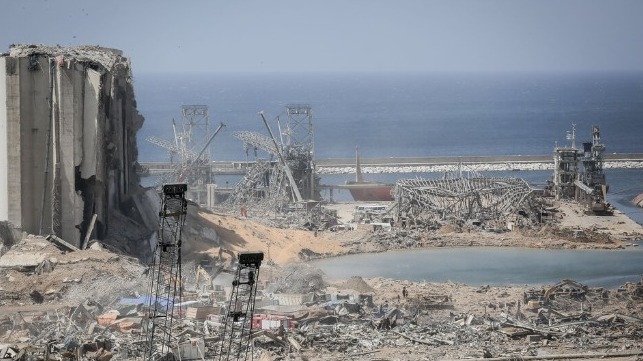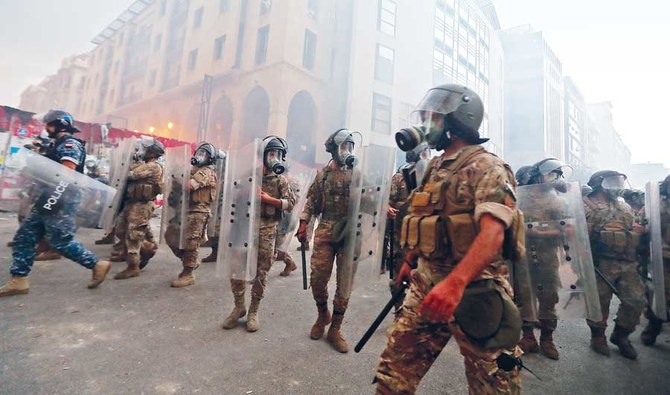
BY THE MARITIME EXECUTIVE -- -- Judge Fadi Sawan, who has led the investigation into the cause of the massive blast at the Port of Beirut last August, has been removed from the case after two former ministers complained of bias. He has been replaced by Tarek Bitar, the head of Beirut's criminal court, effective Friday. The devastating explosion was caused by a cargo of 2,750 tonnes of explosives-grade ammonium nitrate, which had arrived in Beirut in 2013 aboard the freighter Rhosus. When the owner abandoned the vessel over unpaid port fees, Lebanese officials offloaded the cargo and left it in a minimally-guarded warehouse, adjacent to a cache of fireworks. On August 4, it caught fire and detonated, killing 204 people and injuring another 7,500. The blast ranked among the largest non-nuclear explosions in history, and it destroyed a substantial segment of Beirut's waterfront.
Among the three dozen individuals that Sawan charged in the investigation were former finance minister Ali Hassan Khalil; former public works minister Ghazi Zeaiter; a second former public works minister, Youssef Finianos; and current caretaker Prime Minister Hassan Diab. In response, Khalil and Zeaiter filed a formal complaint alleging that Sawan was pursuing political figures in order to satisfy public demands. The court overseeing the case dismissed Sawan last week, finding that he could not be a neutral party because he refused to recognize Khalil and Zeaiter's broad claims of legal immunity - and because his own house was damaged in the explosion. Sawan's replacement, Tarek Bitar, has served as the head of Beirut's criminal court for the past four years. He was first asked to head the explosion inquiry in August, before Sawan was selected; however, he initially turned it down because of the obligations of his existing role, according to L'Orient Today.
by reuters — BEIRUT: Lebanon’s caretaker prime minister Hassan Diab said on Monday he was following up on an oil spill that …
by Nabih Bulos, Marcus Yam --On a remote cliff about 20 miles south of Beirut, a late morning sun roused Imad Beainy. He got out of bed, slipped on a pair of shorts and walked to the cliff's edge, lighting a joint as he looked over the fruit groves and wild meadows of the Bisri Valley. Hewed between two mountain ranges, the valley extends some six miles along a tributary of the Awali river. In the distance, Beainy glimpsed the sun shining off the cream-colored tiles of the 300-year-old Mar Moussa church. Closer to the cliff, sprinkled around a 15th century Mamluk-Ottoman bridge and the ruins of a Roman temple, lay some 50 other archaeological sites. Beainy, 51, spoke of them as if they were his own; that this land was not just a home but a way of life. Yet for the last seven years, the valley and its history have been in jeopardy.
Bisri is to be the site of Lebanon’s second-largest dam, a proposed mega-project to bring water to Beirut’s ever-ballooning neighborhoods. The pressure of such growth underscores an existential threat to the region as governments already on the brink contend with a future in which they can no longer support some of the world's fastest-growing populations. Water scarcity, climate change and erratic weather systems are likely to further imperil stability across the Middle East. No fewer than 12 countries in the region make the list of the world's most water-stressed nations; already-scorching summer temperatures are expected to rise twice as fast as the average global warming, according to the Max Planck Institute for Chemistry. The World Bank predicts the Middle East will become the most economically damaged place on Earth due to climate-related water scarcity.

By NAJIA HOUSSARI -- arabnews.com -- BEIRUT: Lebanon’s caretaker government is under mounting pressure to hold by-elections to fill 10 vacancies in the country’s parliament caused by resignations and the recent deaths of two MPs from COVID-19. In recent months the parliament has lost 10 of its 128 members, raising doubts about legal issues in calculating the quorum, especially with regard to critical sessions, since there is an imbalance of the pact. Eight MPs submitted a collective resignation in protest against the corruption of the ruling authority after the Beirut port explosion. Three of the eight were Kataeb (Phalanges) MPs, while the others were either independent or had left their parliamentary blocs. Two MPs, Michel Murr and Jean Obeid, recently died from COVID-19 complications. The majority of the MPs who have left parliament are Christians, while one is Druze. Of the remaining 118 parliamentarians, 63 are Muslims and 55 Christian.
By-elections were supposed to take place within two months of parliament accepting the resignations of Marwan Hamadeh, Henri Helou, Paula Yacoubian, Nadim Gemayel, Samy Gemayel, Elias Hankach, Nehmeh Afram and Michel Moawad in the wake of the Beirut port blast. However, by-elections have not been held despite caretaker Interior Minister Mohammed Fahmi signing a decree inviting electoral bodies to organize the polls. The caretaker government did not sign the decree, which led to a constitutional violation. However, with the deaths of the two MPs, there has been renewed talk of the need to hold by-elections to fill the vacant seats. Parliamentary Speaker Nabih Berri said this week that he hoped the by-elections could take place in the spring.
Khazen History


Historical Feature:
Churches and Monasteries of the Khazen family

St. Anthony of Padua Church in Ballouneh
Mar Abda Church in Bakaatit Kanaan
Saint Michael Church in Bkaatouta
Saint Therese Church in Qolayaat
Saint Simeon Stylites (مار سمعان العامودي) Church In Ajaltoun
Virgin Mary Church (سيدة المعونات) in Sheilé
Assumption of Mary Church in Ballouneh
1 - The sword of the Maronite Prince
2 - LES KHAZEN CONSULS DE FRANCE
3 - LES MARONITES & LES KHAZEN
4 - LES MAAN & LES KHAZEN
5 - ORIGINE DE LA FAMILLE
Population Movements to Keserwan - The Khazens and The Maans
ما جاء عن الثورة في المقاطعة الكسروانية
ثورة أهالي كسروان على المشايخ الخوازنة وأسبابها
Origins of the "Prince of Maronite" Title
Growing diversity: the Khazin sheiks and the clergy in the first decades of the 18th century
Historical Members:
Barbar Beik El Khazen [English]
Patriach Toubia Kaiss El Khazen(Biography & Life Part1 Part2) (Arabic)
Patriach Youssef Dargham El Khazen (Cont'd)
Cheikh Bishara Jafal El Khazen
Patriarch Youssef Raji El Khazen
The Martyrs Cheikh Philippe & Cheikh Farid El Khazen
Cheikh Nawfal El Khazen (Consul De France)
Cheikh Hossun El Khazen (Consul De France)
Cheikh Abou-Nawfal El Khazen (Consul De France)
Cheikh Francis Abee Nader & his son Yousef
Cheikh Abou-Kanso El Khazen (Consul De France)
Cheikh Abou Nader El Khazen
Cheikh Chafic El Khazen
Cheikh Keserwan El Khazen
Cheikh Serhal El Khazen [English]
Cheikh Rafiq El Khazen [English]
Cheikh Hanna El Khazen
Cheikha Arzi El Khazen
Marie El Khazen

